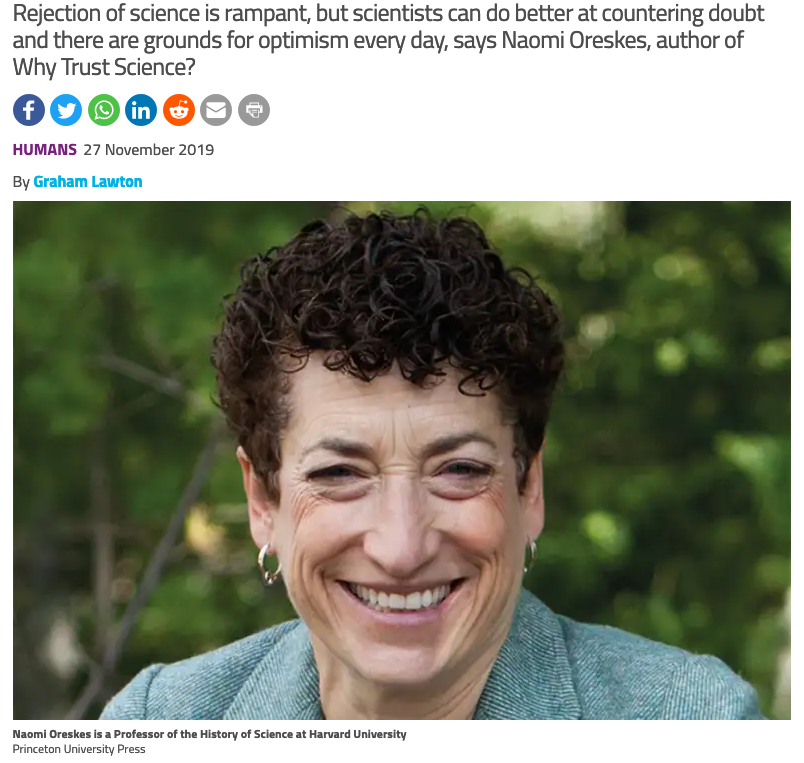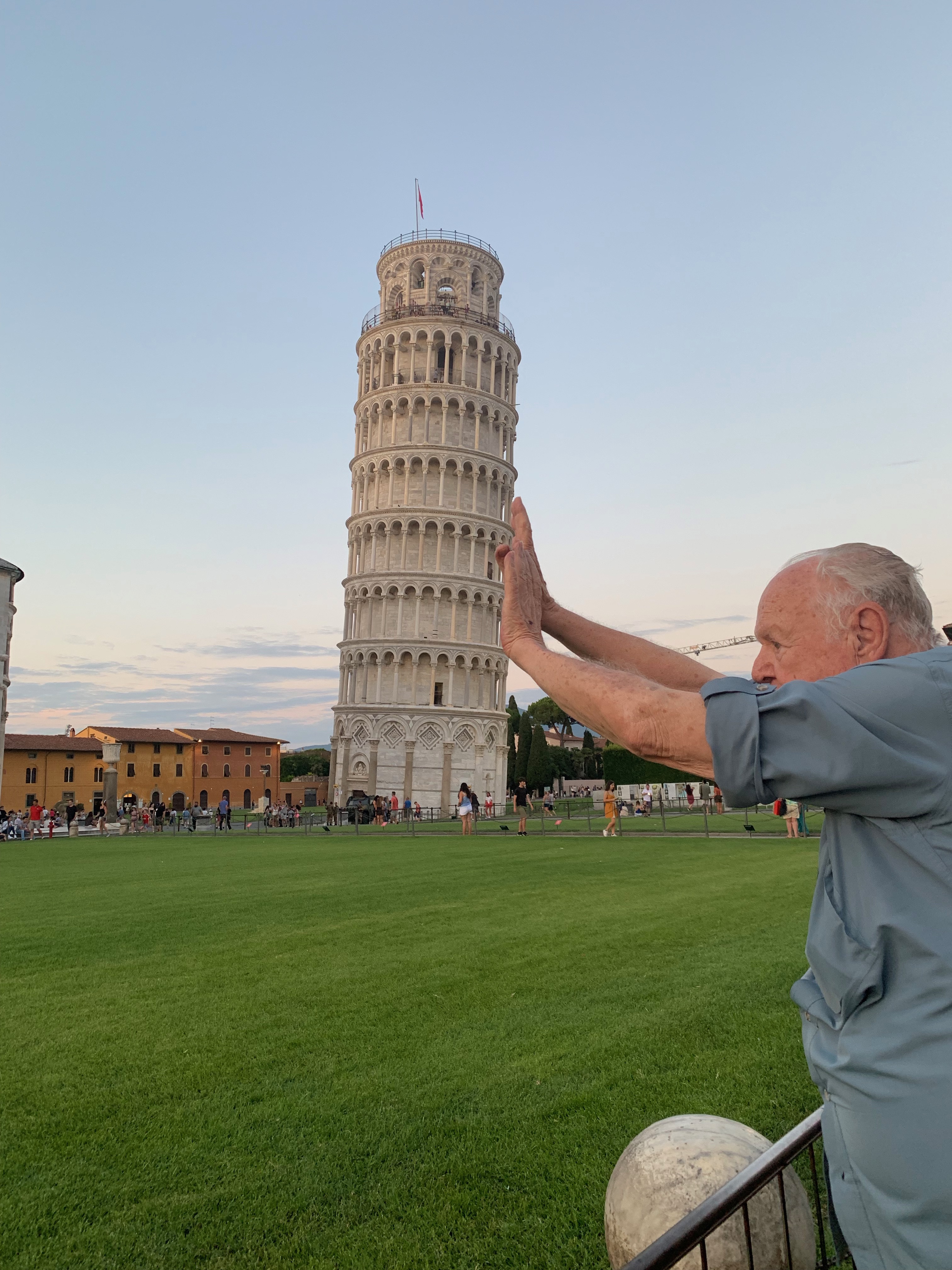
A HISTORIAN of science at Harvard University, Naomi Oreskes is best known for exposing the tactics of science deniers. Her first book Merchants of Doubt, co-authored with Erik Conway, chronicled how industry-funded scientists spread misinformation and doubt about tobacco smoke, climate change, acid rain and more. She has since exposed how the “tobacco playbook” has become the standard corporate strategy to delay regulatory action and protect bottom lines. In her new book Why Trust Science?, she sets out what scientists must do to stem the tide of denialism.
Graham Lawton: We live in troubled times. Have you ever known science denial and misinformation to be so rampant and widespread?
Naomi Oreskes: I don’t like to overstate the situation because we’ve had denial for a long time. However, two things have happened to make things worse. One is the blatant, overt, unapologetic and completely shameless rejection of science by the president of the United States.
The other is that people’s lives are really at stake. Climate change is here, it’s unequivocal. People are being killed by floods and hurricanes. To deny it in the face of human suffering – there’s a moral dimension to that. I can’t think of a word other than “shocking”.
Why do so many people reject and mistrust science?
I would push back on “so many people”. When we look at opinion polls in the US, UK and around the world, the vast majority of people do accept science. But we see resistance to particular scientific conclusions that people think threaten or conflict with their self-interest: that could be economic self-interest, it could be religious beliefs or it could be some kind of political position like commitment to free-market capitalism. Denial is quite specific, not the broad-brush thing that people sometimes make it out to be. And I think that distinction is important, because the solution is different.
It seems that we have gone from science denial to denial of facts and evidence in general. Would you agree with that?
Yes. What we’re seeing is the “manufactured doubt” strategy being universalised as a political tactic, because once you can undermine people’s beliefs in facts and credible authority, then you can say almost anything.
Normally in politics, one of the tools that we use to fight back against things we don’t agree with is to point out when they’re factually incorrect. Now, because there’s so much cynicism and distrust, that’s become extremely difficult.
Social media cops a lot of the blame. Is that fair?
I think it’s an oversimplification. We know from history that you don’t need social media to spread disinformation, you can do it with old-fashioned media. However, I do think social media has made it worse because it’s now possible to get disinformation out to incredibly large audiences rapidly at very low cost. A bunch of guys in a basement can now do a lot of damage and do it pretty quickly.

When corporate interests spread misinformation, it is clear why they are doing it. What motivates the guys in the basement?
People do things for all kinds of reasons. It isn’t just about money. They are often driven by free-market ideology, the idea that if the government intervenes into the marketplace, we’re on the road to socialism. Lots of people buy into this myth – and it is a myth – that government is bad, that any regulation, even to protect your health and safety, is bad. There’s a well-funded and very smart campaign to persuade ordinary people that their self-interest is the same as that of the captains of industry.
Is ideology the only motivation?
Attention-seeking behaviour is part of it too. There are a lot of people who would not be well known who are actually quite famous now because of their climate denialism.
I also think some of them are lonely. Once, this guy gave me a really hard time at a book reading. Then afterwards, he asked me out. And I think they’re scared. Climate change is scary. And when people are frightened, they lash out in all sorts of directions and they often shoot the messenger. When someone comes along and says, “Don’t listen to those geeks, they’re just a bunch of elite, arrogant eggheads” – which, honestly, some of them are – some people find that an attractive message.
You think scientists are partly to blame?
I don’t want to use the word blame. But some way in which we’ve structured science and our understanding of what it is to be a scientist has contributed.
A lot of scientists are really full of themselves, right? There is a certain way in which scientists – not all, but some – can be dismissive of ordinary folks. Scientists have to stop being so arrogant.
The problem is in the way we’re trained and what we’re taught to value. There’s a cultural obsession with the idea that to be a great scientist, you have to be absolutely single-minded. You get no training whatsoever in communication. But there’s plenty of evidence that to communicate is to connect with a fellow human being, and you cannot do that without some degree of emotional investment. So when scientists expunge their emotions, it doesn’t work.
“Once you undermine beliefs in facts then you can say almost anything”
What can scientists do to counter public doubt?
When the doubt thing first happened, most scientists misdiagnosed it. They saw it as a problem of scientific literacy and thought that the response was to explain it more clearly. More facts, more evidence.
That doesn’t work because these people are not lacking information. This is not a knowledge deficit problem, it is a problem of ideologically motivated misinformation. What you have to do is to expose their motivation, and then you can say, “Look, I get it. I care about freedom too. So let’s talk about solutions to this problem that we could achieve without taking away your freedom.” Then you have shifted the terms of debate.
You and others have been banging this drum for years. Do you feel like you have failed?
I don’t think so. We have made people aware that this is not simply a problem of scientific literacy. However, we’re up against really, really big forces.
There is an incredibly powerful and well-funded network, organised and financed by some of the most powerful corporations that have ever existed.
Denial makes me angry, but I don’t know if that is an appropriate response. Does it make you angry?
Oh, absolutely. I think we need to be angry. We need to be outraged. I always say it’s rational to be outraged about things that are outrageous. But then we have to channel that anger and outrage into productive political action.
One of your previous books, The Collapse of Western Civilization, painted a deeply pessimistic picture of the future. Do you still feel that way?
Every single day you can find grounds for optimism. Greta Thunberg is amazing, the Gandhi of climate change. She is clearly motivating lots of people. So is Extinction Rebellion. There is rising anger, people are saying, “This is ridiculous.” I think that’s all good.
But every day, you can also find grounds for pessimism. Are we going to figure out how to dislodge these incredibly powerful forces that we’re up against? I think the jury’s still out on that.
You have yourself been targeted by denialists and misinformation campaigns.
Of course, but I try not to dwell on it. I know it’s toxic. I get
much more support than I get pushback. Most people are with us. Most
people understand the threat. They know it is real and want to do
something about it. I try to stay focused on that.
Read more: https://www.newscientist.com/article/mg24432580-600-naomi-oreskes-turn-your-anger-at-science-denial-into-political-action/#ixzz66ywATYhp
